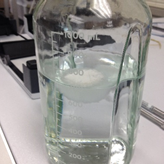Aqueous mobile phases are ripe for microbial growth. This post discusses ways to prevent microbial growth from interfering with your chromatography.
Picking the right mobile phases can be key to developing a robust method – but good mobile phase hygiene is just as important!
Aqueous mobile phases are great breeding grounds for microbes. These microbes can lead to clogging at any point of the flow path, from pump chambers to capillaries to LC columns. Some of those points of clogging are easier to replace or clean out than others.
Here’s what aqueous mobile phase looks like when it’s been left to sit for 6 months:
(Photos courtesy of my colleague Bill)
You may say you’d be crazy to use that mobile phase, but I have colleagues who have seen people do it! Joking aside, microbial growth will cause problems long before it becomes visible to the naked eye, so we must take steps to prevent it even for mobile phases we only plan to use for a couple days.
Effective ways to mitigate microbial growth are to include organic solvents or additives like azide to the solution. For a reverse-phase method where the initial conditions already include some portion of organic solvent, making Mobile Phase A 95/5 H2O/ACN may be a reasonable approach, but for 100% aqueous chromatographies like size exclusion or ion exchange, adding organic solvent simply isn’t an option. Azide is highly toxic, making it an unappealing solution, and some countries and laboratories ban its use outright.
Aqueous mobile phases should be filtered through a 0.45 or 0.2 µm filter to remove microbes and other particulates, after all buffer salts have been dissolved and the pH has been adjusted. (Really, get out that stir bar and stirrer/hotplate if necessary.) Refrigeration can help extend lifetime for up to a few weeks, but at room temperature aqueous mobile phase should be remade fresh every other day at a minimum. As an extra measure, you could add an in-line filter to your LC system, either between the pump and autosampler or immediately before the column depending whether or not you want to filter the sample as well.
Until next time!
Anne
Keywords: Biocolumns, LC, Mobile Phases, Best Practices


